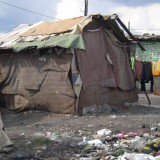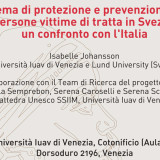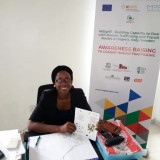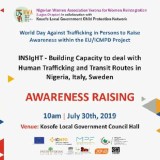SSIIM at IMISCOE Conference on “Migration, Diversity and Cities”- Rotterdam
SSIIM UNESCO Chair organizes two events within the framework of the 14th IMISCOE Annual Conference on “Migration, Diversity and Cities” that will take place at the Erasmus University of Rotterdam, 28-30 June 2017.
IMISCOE – the largest European network of scholars in the area of migration and integration – for its 2017 Annual Conference turns attention to the urban dimension of migration and migration-related diversity, which represents the core of the research carried out at SSIIM UNesco Chair.
SSIIM Unesco Chair will contribute to the Conference with the POLICY WORKSHOP “Neighbourchange: discussing the need of a more socially oriented neighbourhood development policy approach in hyperdiverse local societies” organized by Elena Ostanel and a the PANEL “The (multilevel) governance of migration in European medium and small sized towns” organized by Giovanna Marconi.
PROGRAMME OF THE EVENTS:
Thursday 29 June 15.30 -17.00 (session 123) > POLICY WORKSHOP “Neighbourchange: discussing the need of a more socially oriented neighbourhood development policy approach in hyperdiverse local societies”
Organizer: Elena Ostanel (SSIIM UNESCO Chair)
Participants:
Marcello Balbo (Social and Spatial Inclusion of International Migrants Unesco Chair
David Hulchanski (University of Toronto, Canada)
Fran Meissner (Deprivedhoods research project, TUDelft, The Netherlands)
Antonella Valmorbida (Association for Local Democracy)
Bas Ernst (The Netherlands Embassy in Italy)
Tiit Tammaru (University of Tartu, Finland)
Justus Uitermark (University of Amsterdam, The Netherlands)
Ronald Derks (municipality of Rotterdam, The Netherlands)
Friday 30 June 09.00 -10.30 (session 82) > PANEL “The (multilevel) governance of migration in European medium and small sized towns“
Chair: Giovanna Marconi (SSIIM UNESCO Chair)
Discussants: Susen Engel (Geographisches Institut, HumboldtUniversität zu Berlin) & Rosa Mas Giralt
(University of Leeds, UK)
Papers:
Sarah Hackett (School of Humanities and Cultural Industries, Bath Spa University, UK): “Rethinking Immigrant Policies in Britain: A SmallMedium Town Rural Perspective“
PierLuc Dupont (Rights Institute, University of Valencia, Spain): “Comparing the priorities of integration policy in cities versus small towns: observations from Eastern Spain“
René Kreichauf (Freie Universität Berlin and Graduate School of North American Studies, JohnF.
Kennedy Institute for North American Studies): “Welcoming the Unwelcome. The Local Integration of Late Repatriates and Asylum Seekers in German Small Towns“
Roberta Marzorati (El Colegio de la Frontera Norte, Tijuana, Mexico), Michela Semprebon (SSIIM Unesco Chair, University Iuav of Venice), Paola Bonizzoni (Department of Social and Political Sciences, University of Milan): “Small is (not always) beautiful. Exploring immigration governance in three small towns in Italy”
Panel Abstract:
Political discourse and scientific research on immigration has predominantly focused on large cities and metropolitan areas. Yet, the European urban asset has been historically characterized by a constellation of medium & small (M&S) sized towns that, as evidence shows, are becoming important destinations for both migrants and asylum seekers. Some researchers have recently started paying attention to a series of trends (asylum seekers distribution policies, agricultural and industrial labour restructuring, residential suburbanization, etc.) that make M&Ssized towns new relevant arenas for understanding local processes of immigrant incorporation (Balbo 2015; Barberis and Pavolini 2015; Carr, Lichter & Kefalas 2012; Glick Schiller & Çaglar 2009; Marrow 2005; Massey 2008, Zúñiga and HernándezLeón 2005).
In these contexts, the growth of social, ethnocultural, and religious diversity poses new challenges to social cohesion, particularly with antiimmigrant sentiments and exclusionary policies on the rise. At the same time, whereby M&Ssized towns are facing demographic decline, ageing and a consequent labour shortage, some local authorities are reconsidering the benefits of international migration. Due to their small size and to limits of scale (with reduced space for manoeuvre in terms of policymaking), local governments frequently lack the resources, competence, knowledge and the networks to ensure the definition and implementation of effective inclusionary interventions. Nevertheless, often pushed and supported by civil society organizations, many M&Ssized towns are experimenting innovative ad hoc approaches to migrants’ access to housing, labour and public services.
Against this background, the panel will delve into local policies and practices promoted in M&Ssized towns to cope with the challenges mentioned above. Which resources can they draw upon and which responses are being developed in these localities? To what extent are these outcomes understandable in light of small medium towns specific politicaladministrative features and scalar processes (local political cultures, access to local administrators and service providers, level of social control, activation of multilevel networks, etc.)? How is multilevel governance concretely played out? The panel will explore potentials and limits of M&Ssized towns’ ability to welcome and include migrants and asylum seekers.





